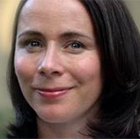Women in Tech Series, Part 1
This two-part series was inspired by an article about women in tech on the site Recode.net.
The article cited a study that found that female entrepreneurs in tech face hard challenges raising money. As of 2010, women represented just 7% of founders in the top companies receiving venture capital investments.
So today we’re highlighting three interviews from the Mixergy vault about how proven female tech founders created profitable companies. Parts two and three will each highlight three more founders.
1. How to Find Partnerships that Bring in New Business
 Burned out on corporate bureaucracy, Elizabeth Dukes built software to help companies run better.
Burned out on corporate bureaucracy, Elizabeth Dukes built software to help companies run better.
Today she is the co-founder of iOffice Corp, which offers innovative facilities management solutions. And one of the ways she’s grown iOffice Corp is through strategic partnerships that bring in new customers.
“We have a couple of partners that are like [ICON], a company called Swiss Post, and we also have a relationship with Sodexo, but only in the Baltic states…go figure,” says Elizabeth. “Then, we also have a lot of other channel partners that are more in the occupancy planning, interior design, move management consulting, so they are more in the services business.
So how does she find these partners?
“We hired somebody who knew the industry well, who knew already the value of the channel partners and the quality of their work, and their customer relationships,” she says. “Then, we developed a program so that they understand their financial obligations, their revenue potential. They could come in at three different tiers, and they understood how we were going to work together from a business perspective, and how we were going to work together in the sales process, in the implementation process. So we have a whole program, so that it’s very clear and expectations are well set between both players.”
In the full interview, Elizabeth gives you the full story about how she launched and grew her company.
2. How to Interview Customers When You’re in an Emerging Market
Adina Mangubat is the founder of Spiral Genetics, a bioinformatics company that makes software for analyzing DNA for medical research.
And like any startup founder who is paying attention, Adina knew early on that she needed to talk to customers.
But how do you do that when you’re in such a new market?
In the beginning, she did it by asking researchers out for a beer.
“There were a bunch of researchers at the University of Washington,” she says. “So, [my cofounder] Becky and I would buy them beer pretty regularly at one of the local pubs and we would just ask them tons of questions.”
So what kinds of questions did she ask?
“It was more about trying to understand their process, how they were thinking about the problem, and what they were hoping to achieve in the future and what they thought was going to be,” says Adina. “What do you think the future of DNA analysis is going to look like in two, three or four years? How do you think it’s going to change?”
That’s because at the time, it was more like “crystal ball work.”
“It’s 2009,” she says. “It costs $100,000 to sequence one person. It’s taking 30 days. For a lot of people, they thought the idea of $1,000 for a genome and people doing hundreds of thousands in the near future was totally insane. It just didn’t look that feasible.”
And once she’d gathered enough data, Adina says they just had to take the plunge.
“Ultimately, I think in a lot of these businesses, especially in emerging markets, you’re going to take your best guess,” she says. “You’re going to put a stake in the ground. You’re going to bet the entire farm on it and hope that your timing is close enough.”
Adina talks about how she launched and grew her software company (with no programming skills) in her full interview.
3. “Gurus” Don’t Always Know Best
Kelly Fitzsimmons said, “I spent eight years being CEO and doing it badly.”
So what did she do badly?
“I started two other businesses while I had SunSu going,” she says. “It was an ego thing, first off. I’m reading these articles about grow this and scale that, you know, why start one when you can start two or three?”
And this was also during the 90s boom.
“There were a lot of very credible people at the time that were saying a lot of things that I believed to be true,” she says. “If I’d had any sort of business acumen, I think I would have been far more doubting but…I didn’t have the wisdom to know that this was just crazy talk.”
Kelly was able to sell one of the businesses to her then-partner for $1. But the other business put Kelly in significant debt. “It was well north of all of my worldly possessions,” she says.
Despite the setbacks, or maybe because of them, Kelly went on to create a very successful business. Today she’s the CEO and cofounder of HarQen, whose software makes voice more useful.
In her full interview, you’ll find out how she did it.
Written by April Dykman.